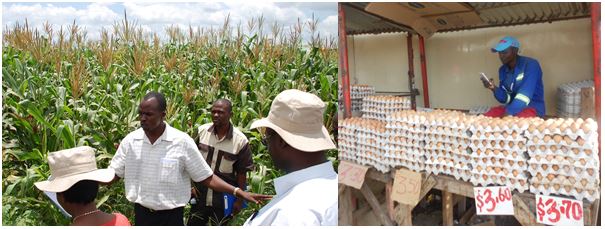In many developing countries, farmers who diversify their sources of information and knowledge are more successful than those who rely on fewer sources. These are some of the issues, eMKambo has uncovered through social listening and sentiment analysis in farming communities and agriculture markets. Another critical observation is that farmers and agricultural organisations struggle with collecting, analysing and acting on feedback from the market and consumers yet such feedback should be integrated into decision-making.
The most important predictor of success in agriculture is becoming the amount social interaction among farmers and other actors. Exposure to peer activity drives learning and changes in behaviour. While cohesive groups of farmers and traders are able to come to an easy consensus for taking action, they have to avoid falling into groupthink where the wrong ideas get reinforced just as much as the right ones are also reinforced. This is often visible through a copycat syndrome where farmers produce the same commodity rather than diversify for the market. Too much imitation among farmers has become a double-edged echo chamber. Farmers exposed to the same sources of information such as field days and the same extension officers often come to a strong consensus on innovative strategies. Unfortunately, they end up merely parroting each other. The same ideas reverberate throughout the whole community, leading to imitation.

It is not easy for farmers who have produced tobacco for years to immediately stop and switch to horticulture. Because useful agricultural knowledge is more complex and contextual, it should be shared through conversational processes. What can make farmers or traders perform better is a mix of cohesiveness and diversity supported by meaningful conservations. Some farmers thrive because they have honed their skills to do few things really well. They have also realized the importance of outside information filtering into their networks. For both farmers and traders, building networks that have financial and social incentives is fundamental.
Mobile technology versus conversations
In spite of the explosion in social media in many African farming communities, holding a conversation remains one of the most treasured skills among farmers and traders. While youth are increasingly relying on their phone screens for communication, you will never find serious farmers pecking at their smartphones when an important conversation is underway. With many youths getting into agriculture, one of the critical skills eMKambo and other agricultural knowledge brokers will have to promote vigorously is the capacity of youths to communicate about agricultural issues in real time through conversations not mobile phones.
Conversational competence is becoming one of the most important skills in agriculture. Mobile technology will never replace this age-old natural skill. Unfortunately it has become the single-most overlooked skill in formal educational institutions such as universities and agricultural colleges. Due to the advent of mobile phones, students and youth spend hours each day engaging with ideas and one another through mobile phones. Rarely do they have an opportunity to hone their interpersonal communication skills, even at home.
Leveraging digital technology
All agricultural markets require a thoughtful presence and an ability to think on your feet. Significant agricultural decisions cannot be made over the phone where discussions are fragmented until they are integrated. That is why although cell phone use is rampant in most farming communities, face to face communication remains more important than texting messages. Rather than trying to customize agricultural projects into tablets and laptops, it is important to continue honing farmers’ conversational skills so that they are able to think and communicate in real time. Text messages and other online discussions such as Whatsapp and twitter do not engage agricultural value chain actors in extended critical thinking and conversation. On the other hand, face-to-face conversation unfolds slowly and teaches patience which is the hallmark of agriculture markets.
We should leverage digital devices to capture and teach the art of conversation towards diversifying sources of knowledge for agricultural value chain actors such as farmers and traders. Mobile technology should be used to encourage farmers to strike a balance between digital literacies and interpersonal conversation. Perhaps the main challenge is identifying farmers and other value chain actors who are more creative in dealing with complex problems and identifying new opportunities. In spite of the explosion of mobile technology, cows still need personal attention. Farmers want to be in a position where they see their entire work system and make it better. This is where conversation is critical because it rides on creativity, curiosity and empathy. Rather than trying to fight existing realities, technology developers should think more like farmers who look at work more holistically and make changes where they make sense.
Contacts
Emails : charles@knowledgetransafrica.com / charles@emkambo.co.zw / info@knowledgetransafrica.com
Website: www.emkambo.co.zw / www.knowledgetransafrica.com
eMkambo Call Centre: 0771 859000-5/ 0716 331140-5 / 0739 866 343-6
